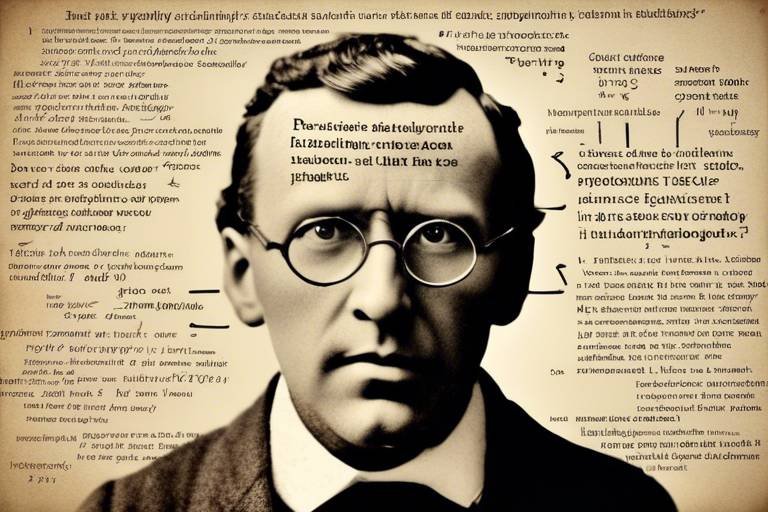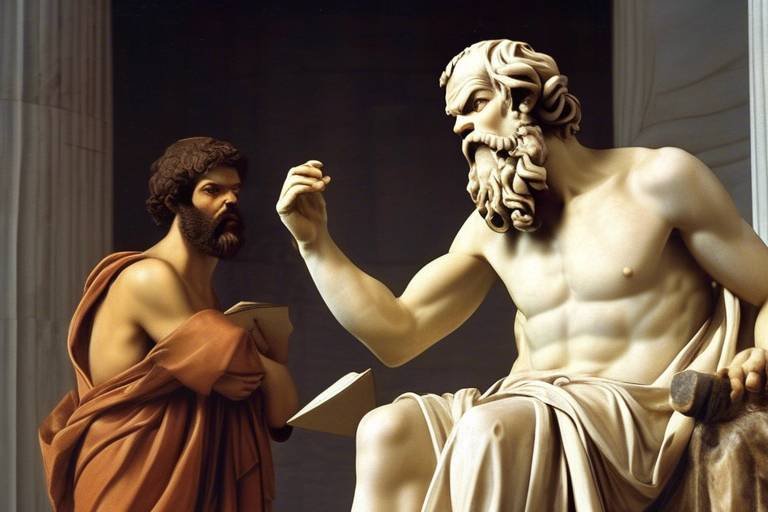The Influence of Grecian Philosophy in the Modern Era
Grecian philosophy, with its rich tapestry of ideas and profound insights, has been a cornerstone of intellectual thought for centuries. Its principles resonate not only in the dusty halls of ancient academia but also in the vibrant discussions of today's society. From the ethical frameworks that guide our moral decisions to the political theories that shape our governance, the echoes of Socrates, Plato, and Aristotle are ever-present. But why does this ancient wisdom still matter? In a world that often feels chaotic and disconnected, Grecian philosophy offers us a compass, helping us navigate the complexities of modern life.
One might wonder how the musings of philosophers who lived over two millennia ago can still hold relevance today. The answer lies in the universality of their questions and the depth of their insights. They tackled fundamental issues about existence, knowledge, ethics, and governance—topics that remain at the forefront of human experience. For instance, consider the concept of virtue ethics, which emphasizes the importance of character and moral virtues. This idea is not just an academic exercise; it serves as a guide for personal development and ethical decision-making in our daily lives.
Moreover, the Grecian approach to rational thought has laid the groundwork for modern scientific inquiry. The scientific method, which is essential for technological advancement and understanding the natural world, can trace its roots back to the analytical frameworks established by ancient philosophers. This connection between philosophy and science exemplifies how intertwined these fields are, revealing that the pursuit of knowledge is a journey that spans generations.
As we delve deeper into the influence of Grecian philosophy, we uncover its impact on various domains, including politics, education, and the arts. Each of these areas reflects the enduring legacy of Grecian thought, showcasing how its principles can be applied to foster a more ethical, just, and aesthetically rich society. In the following sections, we will explore these themes in detail, examining how they continue to shape our contemporary world.
- What are the main contributions of Grecian philosophers? Grecian philosophers like Socrates, Plato, and Aristotle contributed significantly to ethics, metaphysics, epistemology, and political theory, laying the groundwork for Western philosophy.
- How does Grecian philosophy influence modern ethics? Grecian concepts, especially virtue ethics, inform contemporary discussions on morality, emphasizing character development and individual responsibility.
- What is the relevance of Grecian political philosophy today? The ideas of governance proposed by Plato and Aristotle continue to influence modern political discourse, particularly regarding democracy and justice.
- How has Grecian philosophy impacted science? The emphasis on rationality and empirical observation from Grecian thinkers led to the development of the scientific method, which is fundamental in modern scientific research.
- In what ways does Grecian philosophy affect the arts? Grecian ideas on aesthetics shape our understanding of beauty and creativity, influencing how art reflects cultural values and societal issues.

The Roots of Grecian Philosophy
To truly grasp the impact of Grecian philosophy on modern thought, we must first delve into its foundational ideas. Ancient Greece was a vibrant intellectual hub where thinkers like Socrates, Plato, and Aristotle laid the groundwork for various fields of knowledge, including ethics, politics, and metaphysics. Their ideas were not just abstract musings; they were the building blocks of a worldview that continues to resonate today.
Socrates, often regarded as the father of Western philosophy, introduced the concept of critical questioning. His method of inquiry, known as the Socratic method, encouraged individuals to challenge their assumptions and engage in dialogue. This approach is still relevant in modern education and encourages students to think critically rather than passively accept information. Imagine a classroom where students actively debate ideas, fostering a culture of inquiry—this is the essence of Socratic thought.
Following Socrates, his student Plato presented the idea of the ideal forms, positing that the material world is merely a shadow of a higher reality. This notion has influenced various fields, including art and science, prompting discussions about the nature of reality and existence. Plato's allegory of the cave remains a powerful metaphor, illustrating how perception can be limited and how enlightenment comes from seeking deeper truths.
Then we have Aristotle, who took a more empirical approach. He emphasized observation and experience, laying the groundwork for the scientific method. Aristotle's contributions to logic and categorization have shaped not just philosophy but also the way we organize knowledge in various disciplines. His belief that knowledge is acquired through experience and observation resonates with the scientific inquiries of today.
These three philosophers collectively established the core principles of Grecian philosophy, which can be summarized in the following key ideas:
- Critical Inquiry: Encouraging questioning and dialogue.
- Idealism vs. Realism: Exploring the difference between what is perceived and what truly exists.
- Empiricism: Valuing knowledge gained through experience and observation.
Grecian philosophy also emphasized the importance of virtue and ethics, which continue to be relevant in contemporary discussions about morality and governance. The concept of living a good life, or eudaimonia, remains a guiding principle in ethical frameworks today. This idea encourages individuals to strive for personal excellence and contribute positively to society, a sentiment echoed in modern self-help movements and leadership philosophies.
In conclusion, the roots of Grecian philosophy are deeply intertwined with the fabric of modern thought. From the Socratic method that fosters critical thinking to Aristotle's empirical observations that shaped scientific inquiry, these ancient ideas continue to influence our understanding of ethics, politics, and knowledge. As we navigate the complexities of the modern world, revisiting these foundational concepts can provide valuable insights and guidance.

Ethics and Morality in Modern Society
In our fast-paced, ever-evolving world, the concepts of ethics and morality have become more crucial than ever. As we navigate through the complexities of modern life, the ancient teachings of Grecian philosophy provide a solid foundation for understanding what is right and wrong. Imagine being in a bustling marketplace, where every choice you make—whether it’s a simple purchase or a significant life decision—carries ethical weight. This is where the wisdom of philosophers like Socrates, Plato, and Aristotle comes into play, offering us a lens through which we can evaluate our actions and their consequences.
Grecian philosophy, particularly its emphasis on virtue ethics, has a profound impact on contemporary discussions surrounding morality. Virtue ethics focuses on the character of the moral agent rather than merely the consequences of actions or adherence to rules. This approach encourages individuals to cultivate personal virtues such as honesty, courage, and compassion. In a world rife with ethical dilemmas, these virtues act as guiding stars, helping us to navigate the murky waters of moral uncertainty.
To illustrate this point, consider the following scenarios:
- A business faces a dilemma between maximizing profits and ensuring fair labor practices.
- A doctor must decide whether to prioritize patient confidentiality or public safety.
- A politician grapples with the choice between personal gain and serving the public good.
In each case, the application of virtue ethics encourages decision-makers to reflect on their character and the implications of their choices. Are they acting out of greed, fear, or a genuine desire to do good? By fostering a deeper understanding of individual responsibility, Grecian ethics not only shapes personal conduct but also influences broader societal norms.
One of the most significant arenas where Grecian ethical principles manifest is in our educational systems. Schools are increasingly recognizing the importance of character development alongside academic achievement. By integrating virtue ethics into curricula, educators can promote holistic approaches that prepare students to face ethical dilemmas in their personal and professional lives. Imagine a classroom where discussions about integrity and empathy are as vital as math and science lessons. This environment nurtures well-rounded individuals who are equipped to contribute positively to society.
Moreover, the relevance of Grecian ethics extends into the corporate world. In an age where corporate scandals frequently make headlines, the integration of Grecian ethical principles into business practices is essential. Companies that embrace ethical leadership and corporate social responsibility not only enhance their reputations but also foster trust among consumers and stakeholders. Just as Aristotle emphasized the importance of community and the common good, modern organizations can benefit from a similar focus, guiding their decisions with a moral compass that emphasizes long-term societal welfare over short-term gains.
In summary, the influence of Grecian philosophy on ethics and morality in modern society is undeniable. By applying these ancient principles to contemporary issues, we can cultivate a more ethical world—one where our choices reflect our values and contribute to the greater good.
- What is virtue ethics? Virtue ethics is a moral philosophy that emphasizes the role of character and virtue in moral philosophy rather than the consequences of specific actions.
- How can Grecian philosophy be applied in modern education? By integrating discussions of virtue and character development, educators can prepare students to face ethical dilemmas in their personal and professional lives.
- Why is corporate ethics important? Corporate ethics foster responsible leadership and enhance trust between organizations and their stakeholders, contributing to a more sustainable business model.

Virtue Ethics and Its Relevance
When we dive into the realm of ethics, it’s impossible to overlook the profound impact of virtue ethics. This ancient framework, rooted in the teachings of Grecian philosophers like Aristotle, emphasizes the importance of character and the cultivation of moral virtues. In today's fast-paced world, where ethical dilemmas often arise in both personal and professional settings, the relevance of virtue ethics becomes even more pronounced. It encourages individuals to focus not just on the actions they take, but on the kind of person they aspire to be.
Imagine a world where decisions are made not solely based on rules or consequences, but on the virtues that define our character. This is where virtue ethics shines. It invites us to ask ourselves, “What kind of person do I want to become?” and “How can my actions align with that vision?” By fostering qualities such as courage, honesty, and compassion, virtue ethics provides a solid foundation for personal growth and societal well-being.
In practical terms, incorporating virtue ethics into our lives can lead to profound transformations. For example, consider how this ethical approach can influence various aspects of our daily existence:
- Personal Development: Virtue ethics encourages ongoing self-reflection and improvement, helping individuals to develop a strong moral compass.
- Community Engagement: By fostering virtues like empathy and altruism, we can build stronger, more supportive communities.
- Professional Integrity: In the workplace, leaders who embody virtue ethics inspire trust and loyalty among their teams, leading to a more positive organizational culture.
Moreover, the relevance of virtue ethics extends beyond individual actions; it shapes our collective responsibilities. As we navigate complex societal issues, such as climate change or social justice, a virtue ethics framework can guide us in making choices that reflect our shared values. By prioritizing virtues that promote the common good, we foster a sense of community and responsibility that transcends personal interests.
In conclusion, the enduring relevance of virtue ethics in modern society cannot be overstated. It provides a roadmap for ethical decision-making that is rooted in character and virtue, encouraging us to strive for excellence in all areas of our lives. As we continue to face new challenges and ethical dilemmas, embracing the principles of virtue ethics will not only enhance our personal development but also contribute to a more just and compassionate world.

Character Development in Education
Character development in education is not just a buzzword; it’s a vital aspect of shaping well-rounded individuals who can navigate the complexities of modern life. Imagine a classroom where students are not only learning math and science but also how to be empathetic, responsible, and ethical citizens. This holistic approach, deeply rooted in Grecian virtue ethics, emphasizes the importance of character alongside academic achievement. By integrating these principles into educational curricula, schools can foster an environment where students are encouraged to think critically about their actions and their impacts on others.
One of the key elements of character development is the cultivation of virtues such as honesty, courage, and compassion. These virtues are essential not only for personal growth but also for creating a positive school culture. When students learn to value these traits, they become more engaged in their communities, developing a sense of responsibility that extends beyond the classroom. For instance, schools might implement programs that encourage students to participate in community service, helping them to understand the importance of giving back and the role they play in society.
Moreover, the integration of character education can be seen in various teaching methodologies. Educators are increasingly adopting project-based learning and collaborative activities that require students to work together, fostering teamwork and communication skills. In these settings, students are challenged to confront ethical dilemmas, allowing them to practice making decisions based on their values. This experiential learning not only enhances their academic skills but also solidifies their understanding of what it means to be a good citizen.
To further illustrate the impact of character development in education, consider this table that outlines the benefits of integrating virtue ethics into the educational framework:
| Benefit | Description |
|---|---|
| Enhanced Academic Performance | Students with strong character are often more motivated and engaged, leading to better academic outcomes. |
| Improved Social Skills | Character education fosters empathy and collaboration, helping students build meaningful relationships. |
| Increased Civic Engagement | Students who develop a sense of responsibility are more likely to participate in community and civic activities. |
| Lower Behavioral Issues | Teaching virtues can lead to a decrease in bullying and other negative behaviors in schools. |
In conclusion, character development in education is not merely an add-on; it's an essential component that prepares students for life beyond academics. By instilling the values of virtue ethics, educators can help shape individuals who are not only knowledgeable but also compassionate and responsible. The Grecian emphasis on character serves as a guiding light, reminding us that education is about more than just grades; it's about nurturing the leaders of tomorrow.
- What is character development in education? Character development in education refers to the process of teaching students the values and virtues necessary for personal and social responsibility.
- Why is character education important? Character education is crucial as it helps students develop moral and ethical values, which are essential for their overall growth and contribution to society.
- How can schools implement character education? Schools can implement character education through integrated curricula that include discussions on ethics, community service projects, and collaborative learning experiences.
- What are some examples of virtues taught in character education? Common virtues include honesty, respect, responsibility, empathy, and fairness.

Corporate Ethics and Leadership
In today's fast-paced business environment, the importance of corporate ethics cannot be overstated. Companies are no longer judged solely by their financial performance; rather, stakeholders are increasingly concerned with how businesses conduct themselves. This shift has its roots in ancient Grecian philosophy, where the emphasis on ethics and virtue laid the groundwork for responsible leadership. By incorporating Grecian ethical principles into their frameworks, organizations can foster a culture of integrity and accountability.
Grecian thinkers like Socrates, Plato, and Aristotle highlighted the significance of moral virtues in leadership. They argued that true leaders must not only be knowledgeable but also possess a strong ethical foundation. This perspective is particularly relevant today, as leaders are faced with complex decisions that can have far-reaching consequences. When leaders prioritize ethics, they create an environment where trust flourishes, and employees feel valued and respected.
Moreover, ethical leadership can enhance a company's reputation, which is crucial in a world where information spreads rapidly. Consumers are more likely to support brands that demonstrate a commitment to ethical practices. For instance, companies that engage in corporate social responsibility initiatives often see an increase in customer loyalty and brand advocacy. This is where Grecian philosophy shines, as it provides a robust framework for evaluating the moral implications of business decisions.
To illustrate how Grecian ethics can be applied in corporate leadership, consider the following core principles:
- Integrity: Leaders should act with honesty and transparency, ensuring that their actions align with their words.
- Accountability: Taking responsibility for one's actions fosters a culture of trust and respect within the organization.
- Fairness: Ethical leaders strive to treat all stakeholders equitably, considering the impact of their decisions on employees, customers, and the community.
- Empathy: Understanding and valuing the perspectives of others is essential for making informed and ethical decisions.
These principles not only guide individual leaders but also shape the organizational culture, encouraging employees to embody these values in their daily interactions. When the entire organization adopts a strong ethical stance, it becomes a beacon of integrity in the marketplace.
Furthermore, the integration of Grecian ethical principles into corporate governance can lead to improved decision-making processes. For example, companies that prioritize ethical considerations often implement ethical training programs for their employees, ensuring that everyone understands the importance of ethics in their roles. This proactive approach not only mitigates risks but also empowers employees to make decisions that align with the organization's values.
In conclusion, the influence of Grecian philosophy on corporate ethics and leadership is profound and far-reaching. By embracing these ancient principles, modern organizations can cultivate a culture of integrity, accountability, and social responsibility. In a world where ethical lapses can lead to significant consequences, the lessons of Grecian thinkers remind us that true leadership is not just about achieving results but also about doing so with honor and respect for all stakeholders involved.
- What is corporate ethics? Corporate ethics refers to the moral principles that guide the behavior and decisions of a business and its employees.
- How can Grecian philosophy influence modern leadership? Grecian philosophy emphasizes virtues such as integrity, accountability, and fairness, which are essential for ethical leadership.
- Why is ethical leadership important? Ethical leadership fosters trust, enhances a company's reputation, and encourages a positive organizational culture.
- What are some examples of corporate social responsibility? Examples include sustainable business practices, charitable giving, and community engagement initiatives.

Political Philosophy and Governance
The influence of Grecian philosophy on political thought is nothing short of profound. Ancient philosophers like Plato and Aristotle laid the groundwork for our understanding of governance, justice, and the role of the state in society. Their ideas resonate deeply in modern political philosophy, shaping our democratic ideals and the frameworks through which we evaluate governance today. For instance, Plato's concept of the "philosopher-king" emphasizes the need for wise leadership, suggesting that those in power should be well-educated and virtuous. This notion challenges us to consider: are our leaders equipped with the knowledge and moral compass necessary to guide us effectively?
Aristotle, on the other hand, introduced the idea of polity—a balanced form of government that combines elements of democracy and oligarchy. His belief that the best governance arises from the middle class has sparked ongoing debates about representation and the distribution of power. In contemporary discussions, we often grapple with questions of inequality and the mechanisms that ensure fair representation in our political systems. How do we balance the interests of diverse populations while maintaining stability and justice?
Moreover, Grecian political philosophy encourages us to critically examine the purpose of the state. Is it merely to maintain order, or does it have a broader role in promoting the common good? This inquiry has led to the development of various political ideologies, from liberalism to socialism, each interpreting the function of government through different lenses. The idea that governance should serve the people remains a cornerstone of political discourse, prompting us to reflect on our civic duties and the responsibilities of those we elect.
In modern governance, we see the echoes of these ancient philosophies in the frameworks that guide our political systems. Concepts like social contract theory, which posits that individuals consent to form societies and governments for mutual benefit, can be traced back to the dialogues of Socratic thought. This theory has been pivotal in shaping modern democratic ideals, emphasizing the importance of individual rights and collective responsibility.
As we navigate the complexities of contemporary governance, it becomes increasingly vital to engage with these foundational ideas. The dialogues initiated by Grecian philosophers continue to inspire debates on issues such as human rights, justice, and the ethical responsibilities of leaders. By revisiting these ancient texts, we not only honor their legacy but also equip ourselves to tackle the pressing political challenges of our time.
- How did Grecian philosophy influence modern political systems?
Grecian philosophy introduced fundamental concepts of governance, justice, and ethical leadership that continue to shape modern political ideologies and practices. - What are the key ideas of Plato and Aristotle regarding governance?
Plato emphasized the need for wise rulers (philosopher-kings), while Aristotle advocated for a balanced government that represents the middle class, influencing discussions on democracy and representation. - Why is the concept of the social contract important?
The social contract theory highlights the agreement between individuals and the state, emphasizing the importance of mutual consent in governance and the protection of individual rights.

Science and Rational Thought
When we think about the roots of modern science, it’s impossible to ignore the profound impact of Grecian philosophy. The ancient Greeks were not just dreamers; they were also the original architects of rational thought and inquiry. Think about it: before the scientific method became a staple in laboratories around the world, philosophers like Aristotle and Plato were already laying the groundwork for systematic investigation. Their emphasis on observation and reason paved the way for a radically different approach to understanding the universe. In a world filled with myths and superstitions, these thinkers dared to ask questions and seek answers based on evidence and logic.
The Grecian emphasis on rationality and empirical observation was revolutionary. They believed that knowledge could be acquired through a process of questioning and examination, which is the essence of the scientific method. This method relies on several key principles:
- Observation: Gathering data through the senses.
- Hypothesis: Formulating a testable statement.
- Experimentation: Conducting tests to validate or refute the hypothesis.
- Analysis: Interpreting the results to draw conclusions.
- Replication: Ensuring that findings can be repeated by others.
This systematic approach is what allows science to evolve and improve over time. By building on previous knowledge and challenging existing theories, scientists can make groundbreaking discoveries. Imagine if we were still relying solely on ancient myths to explain natural phenomena! The Grecian philosophers encouraged a shift from superstition to a more structured way of thinking about the world, which fundamentally changed how we acquire knowledge.
Today, the influence of Grecian thought can be seen in various fields, from physics to biology. The philosophical discussions initiated by the Greeks continue to resonate in modern debates about the nature of scientific inquiry. For instance, contemporary philosophers of science often revisit questions about the relationship between theory and observation, exploring how our understanding of the universe has evolved through rigorous testing and validation.
Moreover, the ethical implications of scientific advancements are also significant. As we venture into areas like genetic engineering and artificial intelligence, the questions posed by Grecian philosophers about morality and human responsibility become increasingly relevant. How do we ensure that our scientific pursuits align with ethical standards? The discussions initiated by figures like Socrates, who famously questioned the nature of good and evil, are crucial as we navigate these complex issues today.
In summary, the legacy of Grecian philosophy in science is undeniable. It has shaped not only the methods we use to explore the natural world but also the ethical frameworks that guide our scientific endeavors. As we continue to push the boundaries of knowledge, it’s essential to remember the lessons learned from our ancient predecessors. Their commitment to rational thought and empirical investigation serves as a reminder of the power of inquiry in understanding and improving the world around us.
- What is the scientific method?
The scientific method is a systematic process for investigating phenomena, acquiring new knowledge, or correcting and integrating previous knowledge. - How did Grecian philosophy influence modern science?
Grecian philosophy emphasized rationality and empirical observation, which laid the groundwork for the scientific method used in modern scientific inquiry. - Why are ethics important in science?
Ethics ensure that scientific advancements are conducted responsibly and that the implications of research are considered in relation to society and humanity.

The Scientific Method's Origins
The roots of the scientific method can be traced back to ancient Grecian philosophy, where thinkers like Aristotle and Plato laid the groundwork for systematic inquiry and empirical observation. These early philosophers recognized the importance of questioning the world around them, advocating for a methodical approach to understanding nature. Their contributions were not merely academic; they were revolutionary, challenging the status quo and encouraging a culture of curiosity and critical thinking.
Aristotle, in particular, emphasized the significance of observation and categorization in his studies. He believed that knowledge could be derived from the world itself, which was a stark contrast to the prevailing mystical explanations of phenomena. Aristotle's work in various fields—ranging from biology to ethics—illustrated the application of observation and reason, forming the bedrock of what we now recognize as the scientific method. This method involves several key steps, which can be summarized as follows:
| Step | Description |
|---|---|
| 1. Observation | Gathering data about the world through sensory experiences. |
| 2. Hypothesis | Formulating a testable explanation based on observations. |
| 3. Experimentation | Conducting experiments to test the hypothesis under controlled conditions. |
| 4. Analysis | Evaluating the data collected during experiments to draw conclusions. |
| 5. Conclusion | Determining whether the hypothesis is supported or refuted by the data. |
This structured approach not only propelled advancements in various scientific fields but also instilled a rigorous standard for inquiry that continues to be relevant today. The emphasis on empirical evidence and logical reasoning has shaped the way we conduct research and understand phenomena, allowing for a more profound grasp of the complexities of the universe.
Moreover, the legacy of Grecian philosophy extends beyond the mere steps of the scientific method. It fosters an environment where intellectual debate is encouraged, and ideas can be challenged and refined. This dynamic process of inquiry is essential in the modern context, where scientific advancements often raise ethical questions and societal implications. By revisiting the Grecian roots of scientific thought, we not only honor the past but also equip ourselves with the tools necessary to navigate the future.
In conclusion, the origins of the scientific method remind us that the quest for knowledge is not a solitary endeavor but a collective journey that has been enriched by centuries of philosophical thought. The interplay between observation, experimentation, and reasoning continues to drive innovation in science and technology, making it imperative for us to appreciate and understand these foundational principles.
- What is the scientific method? The scientific method is a systematic approach to inquiry that involves observation, hypothesis formulation, experimentation, analysis, and conclusion.
- Who were the key figures in the development of the scientific method? Aristotle and Plato are among the key figures whose philosophical ideas laid the groundwork for the scientific method.
- Why is the scientific method important? It provides a structured framework for investigating phenomena, ensuring that findings are reliable and valid.
- How does Grecian philosophy influence modern science? Grecian philosophy emphasizes empirical observation and critical thinking, which are fundamental to scientific inquiry today.

Philosophy of Science Today
The philosophy of science today is a vibrant and dynamic field that continues to engage with the foundational ideas laid down by ancient Grecian thinkers. As we navigate the complexities of modern scientific inquiry, we often return to the essential questions posed by philosophers like Aristotle and Plato. These questions revolve around the nature of knowledge, the methods of inquiry, and the ethical implications of scientific advancements. In a world where technology evolves at an unprecedented pace, understanding these philosophical underpinnings is more crucial than ever.
One of the key areas of focus in contemporary philosophy of science is the relationship between theory and observation. This relationship is not merely a linear path where observations confirm theories; rather, it is a complex interplay that raises questions about the nature of scientific explanations. For instance, how do we know that our observations accurately represent reality? How do biases influence what we choose to observe? These inquiries echo the Socratic method of questioning and critical thinking, urging scientists and philosophers alike to scrutinize the foundations of their beliefs.
Moreover, the ethical implications of scientific advancements have come to the forefront of philosophical discussions. As we develop technologies that can alter our very existence—such as genetic engineering and artificial intelligence—philosophers grapple with questions of morality and responsibility. What obligations do scientists have to society? How can we ensure that scientific progress does not come at the expense of ethical considerations? These discussions are reminiscent of Aristotle’s concept of telos, or purpose, prompting us to reflect on the ultimate goals of our scientific endeavors.
In addition, the philosophy of science today also examines the role of scientific paradigms—the frameworks within which scientists operate. Thomas Kuhn's idea of paradigm shifts illustrates how scientific revolutions can fundamentally change our understanding of the world. This notion is particularly relevant as we witness rapid advancements in fields like quantum physics and cosmology, which challenge our traditional views of reality. The questioning of established paradigms is not just a scientific endeavor; it is a philosophical one, urging us to remain open-minded and adaptable in our quest for knowledge.
To illustrate the interplay between philosophy and science, consider the following table that outlines some key philosophical questions and their relevance to modern scientific practices:
| Philosophical Question | Modern Relevance |
|---|---|
| What is the nature of scientific truth? | Impacts how we validate scientific findings and theories. |
| How do biases affect scientific inquiry? | Encourages critical examination of data collection and interpretation. |
| What ethical responsibilities do scientists have? | Guides discussions on research ethics and societal impact. |
| How do paradigms shape scientific understanding? | Influences how new theories are accepted or rejected in the scientific community. |
In conclusion, the philosophy of science today is not merely an academic pursuit; it is a vital framework that informs our understanding of the world and our place within it. By revisiting the questions posed by ancient Grecian philosophers, we can better navigate the challenges and opportunities presented by modern science. The dialogue between philosophy and science is ongoing, and it is this very exchange that enriches both fields, ensuring that our pursuit of knowledge remains grounded in ethical considerations and critical thought.
- What is the significance of Grecian philosophy in modern science? Grecian philosophy laid the groundwork for critical thinking and the scientific method, influencing how we approach scientific inquiry today.
- How do ethical considerations impact scientific research? Ethical considerations guide researchers to conduct their work responsibly, ensuring that advancements benefit society without causing harm.
- What role do paradigms play in scientific progress? Paradigms shape the frameworks within which scientists operate, influencing how theories are developed, accepted, or challenged over time.

Art and Aesthetics
The influence of Grecian philosophy on art and aesthetics is as profound as it is enduring. From the vibrant hues of ancient pottery to the intricate sculptures that adorn museums today, the principles laid down by ancient philosophers continue to resonate within modern artistic expressions. Think about it: when we gaze at a piece of art, we are not merely looking at colors and shapes; we are engaging with a complex interplay of emotions, ideas, and cultural narratives that have been shaped over centuries. The Grecians understood this connection deeply, viewing art as a reflection of the human experience and a medium through which societal values could be expressed and examined.
One of the key contributions of Grecian philosophy to aesthetics is the idea of beauty as a form of truth. Philosophers like Plato posited that beauty is not just a superficial quality but a manifestation of deeper truths about the universe. This notion encourages us to look beyond mere appearances and to seek the underlying significance in artistic works. For instance, consider how a painting can evoke feelings of joy, sorrow, or nostalgia—these reactions are not coincidental; they stem from the artist's ability to tap into universal truths that resonate with our own experiences.
Moreover, the Grecians believed that art serves a crucial role in shaping cultural identity. The works of artists were not only personal expressions but also reflections of the societal values and beliefs of their time. This perspective remains relevant today, as contemporary artists grapple with issues such as identity, politics, and social justice. By examining the themes present in modern art, we can gain insights into the prevailing cultural narratives that define our society. For example, street art often addresses social issues and challenges the status quo, prompting viewers to reflect on their own beliefs and values.
In addition, the Grecian concept of mimesis, or imitation, highlights the relationship between art and reality. This idea suggests that art should not merely replicate the world but interpret and reimagine it. This perspective fosters creativity and innovation, encouraging artists to push boundaries and explore new forms of expression. Today, we see this in various art movements that challenge traditional notions of beauty and representation, such as abstract expressionism and conceptual art.
To further illustrate the impact of Grecian philosophy on modern art, consider the following table that outlines key philosophical ideas and their manifestations in contemporary artistic practices:
| Grecian Idea | Contemporary Manifestation |
|---|---|
| Beauty as Truth | Art that explores existential themes and human emotions |
| Art as Reflection of Society | Political art and activism through visual media |
| Mimesis | Abstract and conceptual art that reinterprets reality |
Ultimately, the Grecian philosophical framework provides us with valuable tools for understanding and appreciating art in all its forms. By acknowledging the emotional and intellectual experiences that artworks evoke, we can deepen our connection to the art we encounter. Whether we are admiring a classic sculpture or engaging with contemporary installations, the legacy of Grecian thought reminds us that art is not just an aesthetic experience; it is a vital part of our collective human journey.
- How did Grecian philosophy influence modern art? Grecian philosophy introduced concepts such as beauty as truth and the relationship between art and society, which continue to shape artistic expression today.
- What is mimesis in art? Mimesis refers to the idea that art should imitate reality, but contemporary interpretations encourage artists to reinterpret and challenge conventional representations.
- Why is the emotional experience of art important? The emotional responses elicited by art connect us to universal human experiences, allowing us to reflect on our own lives and societal values.

The Aesthetic Experience
The concept of the aesthetic experience is one of the most profound legacies of Grecian philosophy, shaping how we perceive and interact with art today. Imagine walking into a gallery, your senses tingling as vibrant colors dance before your eyes, each brushstroke telling a story that resonates deep within your soul. This is the essence of the aesthetic experience—a moment where art transcends mere representation and becomes a vessel for emotional and intellectual engagement. In ancient Greece, philosophers like Plato and Aristotle contemplated the nature of beauty and art, pondering how these elements influence human experience and society.
For Plato, art was a reflection of ideal forms, a way to connect with the transcendent truths of existence. He believed that the aesthetic experience could elevate the soul, guiding individuals toward higher understanding and moral virtue. Aristotle, on the other hand, emphasized the emotional impact of art, suggesting that it could evoke catharsis—a purging of emotions that leads to personal growth. Together, these perspectives illustrate the dual nature of art: it is both a mirror reflecting society and a transformative force that shapes our inner lives.
In modern times, the aesthetic experience continues to be a vital part of our cultural landscape. It invites us to appreciate not just the visual beauty of art but also the deeper meanings and emotions it conveys. Whether it’s a powerful painting, a moving piece of music, or a thought-provoking film, the aesthetic experience can evoke a range of feelings, from joy and nostalgia to sadness and reflection. This interaction between the viewer and the artwork creates a dialogue that is both personal and universal.
To better understand the elements that contribute to the aesthetic experience, consider the following components:
- Emotional Resonance: How does the artwork make you feel? Does it evoke joy, sadness, or nostalgia?
- Intellectual Engagement: Does the piece challenge your thoughts or provoke questions about society, culture, or existence?
- Contextual Understanding: How does the historical and cultural background of the artwork influence your perception?
These elements work together to create a rich tapestry of experience that can profoundly affect our understanding of ourselves and the world around us. The aesthetic experience is not just about passive observation; it’s an active engagement that encourages us to explore our values, beliefs, and emotions.
As we navigate through life, the aesthetic experiences we encounter can serve as touchstones, reminding us of our shared humanity and the complexities of the human condition. They encourage us to reflect on our place in the world and inspire us to engage with the beauty and challenges of life. In this way, Grecian philosophy continues to resonate, reminding us that art is not merely an object to be admired but a vital part of the human experience that fosters connection, understanding, and growth.
- What is the aesthetic experience? The aesthetic experience refers to the emotional and intellectual engagement one has with art, where it transcends mere observation and becomes a profound interaction.
- How did Grecian philosophers influence our understanding of aesthetics? Philosophers like Plato and Aristotle explored the nature of beauty and art, emphasizing their roles in moral development and emotional catharsis.
- Why is the aesthetic experience important today? It fosters personal growth, encourages critical reflection on societal values, and enhances our emotional intelligence through engagement with art.

Art as a Reflection of Society
Art has always been a mirror, reflecting the complexities of society, culture, and the human experience. This idea, rooted in Grecian philosophy, posits that art is not merely an aesthetic endeavor but a profound commentary on the world around us. Just as the ancient Greeks believed that art could convey moral truths and provoke thought, contemporary artists continue to explore themes that resonate with current societal issues. From political turmoil to social justice movements, art serves as a powerful medium for expression and critique.
Consider how the works of famous artists like Pablo Picasso and Frida Kahlo have encapsulated the spirit of their times. Picasso’s Guernica, for instance, is not just a painting; it's an emotional response to the horrors of war, a visual protest against the violence that ravaged Spain during the Spanish Civil War. Similarly, Kahlo's deeply personal works delve into themes of identity, pain, and gender, reflecting her own struggles as well as broader societal issues. These artists, among many others, illustrate how art can challenge viewers to confront uncomfortable truths about their world.
Moreover, the rise of digital art and social media has transformed the landscape of artistic expression, allowing artists to engage with audiences in real-time. Platforms like Instagram and TikTok have democratized art, enabling a diverse range of voices to emerge. This shift has led to a vibrant dialogue about cultural representation, inclusivity, and the role of art in activism. In fact, many contemporary artists use their platforms to highlight pressing issues such as climate change, racial inequality, and mental health, fostering a sense of community and awareness.
To further illustrate this connection between art and society, consider the following examples:
| Artist | Artwork | Social Issue Addressed |
|---|---|---|
| Banksy | Girl with a Balloon | Hope and Innocence |
| Ai Weiwei | Sunflower Seeds | Mass Production and Individuality |
| Kara Walker | A Subtlety | Race and Gender |
This table highlights how various artists have tackled significant social issues through their work, demonstrating that art is not created in a vacuum but is deeply intertwined with the societal context in which it exists. Each piece serves as a conversation starter, inviting viewers to reflect on their own beliefs and the world around them.
In conclusion, the relationship between art and society is a dynamic and evolving one. As we navigate the complexities of modern life, art remains a vital means of understanding and interpreting our experiences. It challenges us to think critically about our surroundings, encouraging dialogue and fostering empathy. Just as the ancient Greeks understood the power of art to influence thought and action, we too can harness its potential to reflect and reshape the world we live in.
- How does art reflect societal values? Art often embodies the values, struggles, and aspirations of a society, acting as a record of its cultural identity.
- Can art influence social change? Yes, art has the power to raise awareness, provoke discussion, and inspire action on social issues.
- What role does the artist play in society? Artists serve as commentators and critics, using their work to challenge norms and inspire change.
- How has technology changed the way we perceive art? Technology has broadened access to art, enabling diverse voices to emerge and engage with audiences globally.
Frequently Asked Questions
- What are the key contributions of Socrates, Plato, and Aristotle to modern thought?
Socrates introduced the idea of questioning and dialogue as a means of gaining knowledge, which influences modern education and critical thinking. Plato's theory of forms shapes our understanding of ideals and reality, impacting philosophy and art. Aristotle's emphasis on empirical observation laid the groundwork for the scientific method, which is foundational in contemporary science and rational thought.
- How does virtue ethics apply to modern ethical dilemmas?
Virtue ethics focuses on the character of individuals rather than just the consequences of their actions. This perspective encourages personal responsibility and character development, which are essential in navigating complex moral situations in today's society, from personal relationships to corporate ethics.
- In what ways has Grecian philosophy influenced modern political systems?
Grecian political philosophy, particularly the works of Plato and Aristotle, continues to shape our understanding of democracy, justice, and governance. Their ideas encourage ongoing debates about the role of the state and the importance of civic responsibility, which are crucial in today's political landscape.
- What is the significance of the scientific method in relation to Grecian philosophy?
The scientific method, which emphasizes observation, experimentation, and critical thinking, has its roots in Grecian philosophy. This method is essential for advancing knowledge and technology, as it allows for systematic investigation and fosters a deeper understanding of the natural world.
- How do Grecian concepts of art and aesthetics influence contemporary art?
Grecian philosophy has profoundly shaped our appreciation of beauty and creativity. It encourages us to examine how art reflects societal values and cultural issues, prompting a deeper emotional and intellectual engagement with artworks and their impact on our identity and community.



















